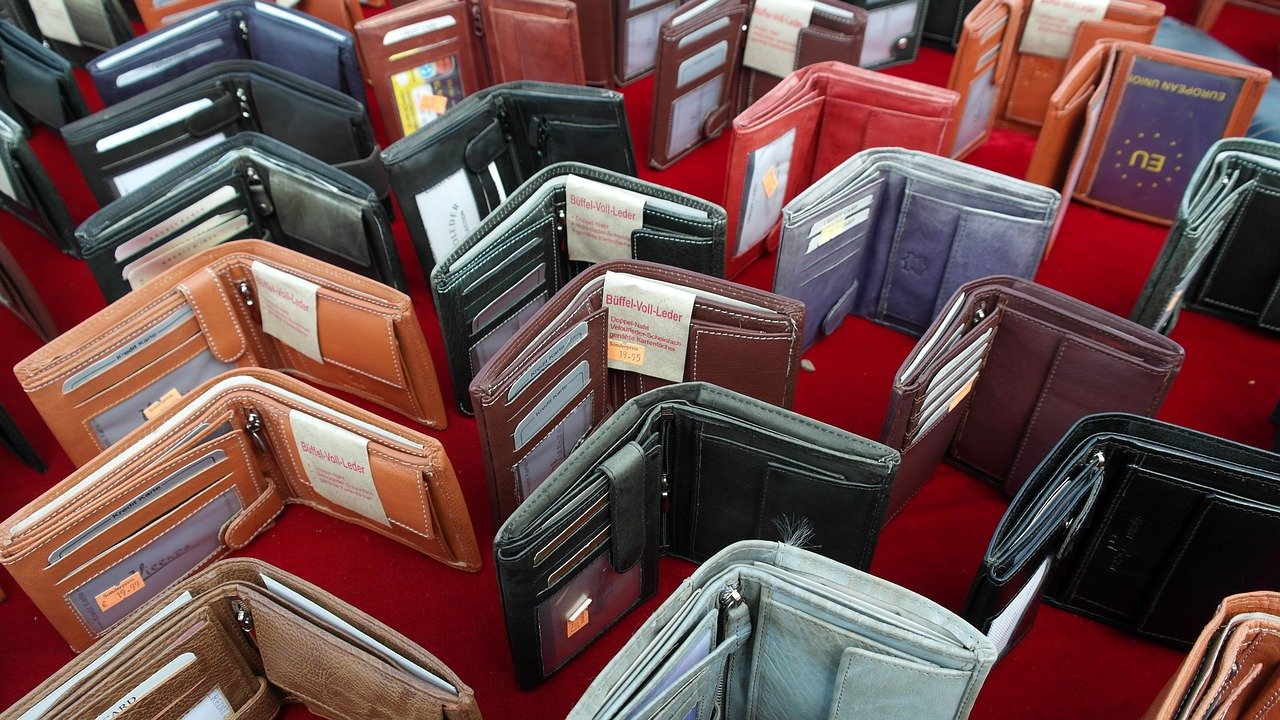Unveiling the Latest Insights into Smart Wallet Technology
December 24, 2023 | by bi-fold-wallet.com

Imagine a world where your wallet is not just a simple accessory, but an intelligent device that seamlessly integrates with your daily life. The latest insights into smart wallet technology reveal a fascinating future where convenience and security reign supreme. From contactless payments and digital receipts to tracking your spending habits and even finding your wallet when it’s lost, this cutting-edge technology is set to revolutionize the way we manage our finances. Join us as we explore the exciting features and potential of smart wallets, and discover how they are poised to become an indispensable part of our digital age.
Check out our product reviews.
The History of Smart Wallets
Early Development and Introduction
Smart wallets, a revolutionary advancement in the world of finance and technology, have a fascinating history that dates back to the early 2000s. The concept of a smart wallet was initially conceived as a solution to the growing need for convenience and security in payment methods. As technology continued to advance, companies began exploring ways to integrate digital and financial services into a compact and portable device.
The first smart wallet prototypes emerged in the mid-2000s, combining traditional wallets with electronic components such as RFID chips and sensors. These early versions offered basic features like contactless payment and integration with mobile devices, laying the foundation for the evolution of smart wallets as we know them today.
Evolution of Smart Wallet Technology
Over the years, smart wallet technology has undergone significant advancements, becoming more versatile and sophisticated in its capabilities. With the rapid development of smartphones and wearable devices, smart wallets have seamlessly integrated with these gadgets, allowing users to access a wide range of functionalities from a single device.
Key Features and Functionality of Smart Wallets
Contactless Payment Technology
One of the key features that set smart wallets apart is their ability to facilitate contactless payments. This technology, commonly known as near field communication (NFC), allows users to make secure payments simply by tapping their smart wallet on a compatible payment terminal. This eliminates the need for carrying physical cash or credit cards, making transactions faster and more convenient.
Integration with Mobile Devices
Smart wallet technology has rapidly evolved to integrate with mobile devices, such as smartphones and smartwatches. By pairing a smart wallet with a mobile device, users can manage their financial transactions, track expenses, and receive real-time notifications effortlessly.
Biometric Authentication
Smart wallets have also embraced biometric authentication, providing users with enhanced security and convenience. Through features like fingerprint sensors or facial recognition technology, users can securely access their smart wallets and authorize payments without the need for PIN codes or passwords.
Tracking and GPS Features
To address concerns related to lost or misplaced wallets, smart wallets now come equipped with tracking and GPS features. These functionalities enable users to locate their wallets using their mobile devices, reducing the risk of theft and increasing peace of mind.
Expense and Budget Tracking
Smart wallets have proven to be an efficient tool for expense and budget tracking. Through integrated apps and software, users can monitor their spending habits, categorize transactions, and set monthly budgets. This level of financial visibility empowers individuals to make informed decisions about their money and achieve their financial goals.

This image is property of images.pexels.com.
Check out our product reviews.
Benefits and Advantages of Smart Wallets
Convenience and Accessibility
One of the primary advantages of smart wallets is the unparalleled convenience they offer. By consolidating multiple functions into one device, users can carry their virtual wallets with ease and access them anytime, anywhere. No longer a burden to carry a bulky wallet or sift through a stack of cards, smart wallets streamline the payment process and simplify daily financial management tasks.
Enhanced Security
Smart wallets address several security concerns associated with traditional wallets. With built-in encryption and secure authentication methods, smart wallets protect user information and financial data from unauthorized access. Biometric authentication adds an extra layer of security, significantly reducing the risk of identity theft or fraudulent transactions.
Efficient Expense Management
The integration of expense and budget tracking features into smart wallets transforms these devices into powerful financial management tools. The ability to categorize expenses, set budgets, and monitor spending patterns allows users to gain valuable insights into their financial habits. By fostering a more disciplined approach to money management, smart wallets help individuals save money and achieve their financial goals.
Challenges and Concerns with Smart Wallets
Privacy and Data Security
As with any technology that handles sensitive personal data, privacy and data security are significant concerns for smart wallet users. It is essential to choose reputable brands and service providers that prioritize stringent security measures and adhere to industry standards. Understanding the data collection and usage practices of smart wallet providers can help users make informed decisions about their privacy.
Compatibility and Interoperability
With various smart wallet brands and platforms available in the market, compatibility and interoperability can be a concern. Ensuring that a smart wallet is compatible with existing payment terminals and mobile devices is crucial to maximize its usability. Industry collaborations and standardized protocols can help overcome these compatibility issues and provide a seamless experience for users.
Reliability and Battery Life
Reliability and battery life are areas where smart wallets have room for improvement. While advancements in battery technology have allowed smart wallets to operate for extended periods, users often find themselves needing to charge their devices frequently. Improving battery life and reliability are essential factors in enhancing the overall user experience of smart wallets.

This image is property of images.pexels.com.
Top Smart Wallet Brands in the Market
Apple
Apple, a pioneer in smart technology, offers its own smart wallet solution known as Apple Wallet. Through its integration with iPhones and Apple Watches, Apple Wallet provides users with a seamless and secure mobile payment experience. With its emphasis on privacy and strong encryption standards, Apple Wallet has gained significant popularity among users worldwide.
Samsung
Samsung has also made notable strides in the smart wallet market with its Samsung Pay platform. By leveraging both NFC and Magnetic Secure Transmission (MST) technologies, Samsung Pay ensures compatibility with a wide range of payment terminals. The convenience and reliability of Samsung Pay have made it a preferred choice for users who value a seamless payment experience.
Google’s entry into the smart wallet space comes in the form of Google Pay. With its integration across various Google services and Android devices, Google Pay offers users a simple and secure payment solution. The ability to send money to friends, store digital tickets, and access loyalty cards makes Google Pay a versatile and user-friendly smart wallet option.
Fitbit
Known primarily for its fitness trackers and smartwatches, Fitbit has also ventured into the smart wallet market with its Fitbit Pay feature. Designed to work seamlessly with Fitbit devices, Fitbit Pay allows users to make contactless payments with a flick of their wrist. This integration of health and finance features has attracted fitness enthusiasts who appreciate the convenience of an all-in-one device.
Smart Wallets and the Future of Financial Technology
Integration with Internet of Things (IoT)
The future of smart wallets lies in their integration with the Internet of Things (IoT). As more devices become interconnected, the potential for smart wallets to interact with everyday objects like household appliances and vehicles opens up exciting possibilities. Imagine a smart wallet that automatically adjusts your budget based on your energy consumption or a car that refuels and pays for itself using your smart wallet. The IoT holds immense potential for transforming smart wallets into comprehensive financial hubs.
Artificial Intelligence (AI) and Machine Learning
Smart wallets of the future are likely to harness the power of artificial intelligence (AI) and machine learning algorithms. By analyzing spending patterns and financial behaviors, AI-powered smart wallets can provide personalized financial recommendations and predictive insights. The ability to automatically optimize budgets, suggest savings opportunities, and provide tailored financial advice will revolutionize the way individuals manage their finances.
Blockchain Technology
The integration of blockchain technology into smart wallets has the potential to redefine financial security and transparency. Blockchain enables secure and decentralized transactions, eliminating the need for intermediaries and central authorities. With blockchain-powered smart wallets, users can enjoy a higher level of security, faster transactions, and reduced fees, ushering in a new era of trust and accessibility in financial technology.

This image is property of images.pexels.com.
Smart Wallets and Sustainable Finance
Reducing Paper Currency Usage
Smart wallets contribute to sustainable finance by reducing the reliance on paper currency. By promoting digital transactions, smart wallets minimize the need for printing money and the associated environmental impact. With the growing adoption of smart wallets, the volume of paper currency circulation can be significantly reduced, leading to a greener and more sustainable future.
Promoting Digital Transactions
Digital transactions facilitated by smart wallets offer numerous benefits to both individuals and society at large. By encouraging the use of digital payment methods, smart wallets reduce the reliance on physical cash, leading to increased efficiency and reduced costs involved in handling, transporting, and securing paper currency. Additionally, digital transactions leave a digital trail, enabling better transparency and accountability in financial transactions.
Consumer Adoption and Market Trends of Smart Wallets
Growing Popularity and Usage
Smart wallets are experiencing a surge in popularity as consumers embrace the convenience and benefits they offer. The ease of making contactless payments, tracking expenses, and managing budgets has resonated with individuals seeking a more seamless and digital lifestyle. As user awareness and acceptance of smart wallet technology continue to grow, the market is poised for further expansion and innovation.
Shift towards Cashless Economies
A significant trend that has emerged in recent years is the shift towards cashless economies. Governments and financial institutions worldwide are encouraging the adoption of digital payment methods to modernize financial systems and reduce the black market economy. Smart wallets are playing a pivotal role in enabling this transition, providing individuals with a secure and easy-to-use alternative to cash.
Regional Market Variations
While smart wallets are gaining traction globally, market variations exist in different regions. Developed economies, such as the United States and European countries, have witnessed rapid adoption due to their advanced payment infrastructure. In contrast, developing regions, particularly those with limited access to traditional banking services, have seen a slower adoption rate. However, as technology advancements and smartphone penetration increase, these regions are likely to embrace smart wallets as a vital tool for financial inclusion.
Smart Wallet Security Best Practices
Strong PIN and Password Protection
The first line of defense in securing a smart wallet is setting strong PIN codes and passwords. By choosing passwords that are unique, long, and complex, users can significantly reduce the risk of unauthorized access to their financial information. Regularly updating PIN codes and passwords is also essential to maintain security.
Regular Software Updates
Smart wallet manufacturers regularly release software updates to address security vulnerabilities and improve device performance. Users should ensure that their smart wallets are running the latest software version by regularly checking for updates and installing them promptly. This simple practice can help mitigate potential security risks.
Avoiding Untrusted Apps and Sources
To protect against malware and phishing attacks, users should be cautious when downloading apps or visiting websites related to smart wallets. It is advisable only to use trusted sources, such as official app stores, to download smart wallet applications. Being vigilant and avoiding suspicious links or requests for sensitive information can help prevent unauthorized access to personal data.
Using NFC Blocking Technology
To prevent unauthorized access to smart wallets via contactless payment methods, users can invest in NFC blocking technology. These devices, such as RFID-blocking wallets or sleeves, block the signals emitted by smart wallets, ensuring that contactless payment transactions can only be initiated intentionally.
Smart Wallets and Personal Data Privacy
Data Collection and Usage Practices
Smart wallet providers may collect user data to improve their services and offer personalized recommendations. However, it is crucial for users to understand what information is collected, how it is stored, and how it is used. Reviewing privacy policies and settings can help users make informed decisions about the data shared with smart wallet providers.
Understanding Privacy Settings
Smart wallets often provide users with control over privacy settings, allowing them to customize the information they share and with whom it is shared. Taking the time to review and adjust privacy settings according to personal preferences can enhance data privacy and ensure a more personalized user experience.
Legislation and Regulation
As smart wallet technology continues to evolve, legislation and regulation play vital roles in safeguarding personal data privacy. Governments and regulatory bodies are increasingly focusing on data protection laws to ensure that smart wallet providers adhere to stringent privacy standards. Users should stay informed about relevant regulations and support initiatives aimed at protecting personal data privacy.
In conclusion, smart wallets have come a long way since their early development, transforming the way we make payments and manage our finances. With their convenience, enhanced security, and potential for innovation, smart wallets are poised to play a significant role in shaping the future of financial technology. As consumer adoption continues to grow, it is essential for individuals to prioritize security best practices and understand the implications of using smart wallets in this digital age.
RELATED POSTS
View all


